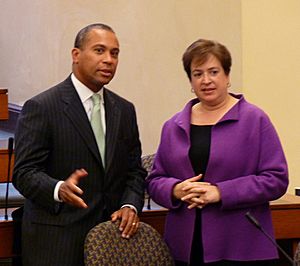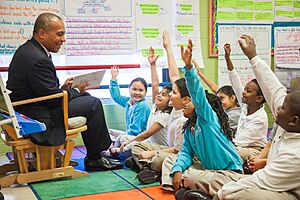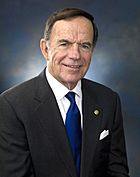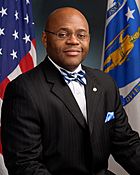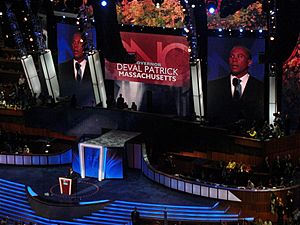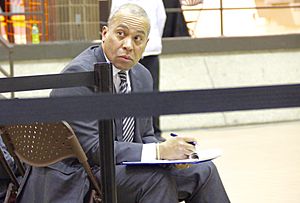Deval Patrick facts for kids
Quick facts for kids
Deval Patrick
|
|
|---|---|
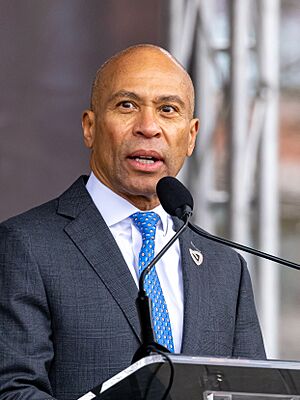
Patrick in 2023
|
|
| 71st Governor of Massachusetts | |
| In office January 4, 2007 – January 8, 2015 |
|
| Lieutenant | Tim Murray (2007–2013) Vacant (2013–2015) |
| Preceded by | Mitt Romney |
| Succeeded by | Charlie Baker |
| United States Assistant Attorney General for the Civil Rights Division |
|
| In office April 22, 1994 – January 20, 1997 |
|
| President | Bill Clinton |
| Preceded by | John R. Dunne |
| Succeeded by | Bill Lann Lee |
| Personal details | |
| Born |
Deval Laurdine Patrick
July 31, 1956 Chicago, Illinois, U.S. |
| Political party | Democratic |
| Spouse | |
| Children | 2 |
| Education | Harvard University (BA, JD) |
| Signature | |
Deval Laurdine Patrick (born July 31, 1956) is an American politician. He served as the 71st governor of Massachusetts from 2007 to 2015. He was the first African-American Governor of Massachusetts. He was also the first Democratic governor of the state since Michael Dukakis left office in 1991. Before becoming governor, Patrick worked for the Civil Rights Division from 1994 to 1997. He was appointed by President Bill Clinton. Patrick also briefly ran for President of the United States in 2020.
Patrick grew up in Chicago. He earned a scholarship to Milton Academy in Massachusetts. He then attended Harvard College and Harvard Law School. After law school, he worked for the NAACP Legal Defense and Educational Fund. He later joined a law firm in Boston. In 1994, he became the United States assistant attorney general for civil rights. In this role, he worked on issues like racial profiling and police misconduct. He was first elected governor in 2006 and reelected in 2010.
During his time as governor, Patrick helped put in place the state's 2006 health care reform program. He also increased money for education and science. He won a federal grant for education called "Race to the Top." He also created the Massachusetts Department of Transportation. The state sales tax increased from 5% to 6.25% under his leadership. The state's minimum wage also went up. Massachusetts joined the Regional Greenhouse Gas Initiative to help reduce greenhouse gas emissions.
After being governor, Patrick worked at Bain Capital, a private investment firm. He also led a program called Our Generation Speaks. This program helps young Israeli and Palestinian leaders through business. In 2024, Patrick joined The Vistria Group, another investment firm. He became a Senior Partner there in November 2024.
Contents
- Early Life and Education
- Professional Career
- Governor of Massachusetts
- After Being Governor
- Electoral History
- Personal Life
- Images for kids
- See also
Early Life and Education
Deval Patrick was born on July 31, 1956, in Chicago. His family lived in a small apartment in a housing project. His father, Pat Patrick, was a jazz musician. His father left the family when Deval was young. Deval was raised by his mother.
When Patrick was in middle school, a teacher helped him get a scholarship. This allowed him to attend Milton Academy in Massachusetts. He graduated from Milton Academy in 1974. He was the first in his family to go to college. He graduated from Harvard College in 1978 with a degree in English and American literature.
Patrick then went to Harvard Law School and graduated in 1982. After law school, he worked as a law clerk for a judge. In 1983, he joined the NAACP Legal Defense and Educational Fund (LDF). He worked on cases about voting rights and the death penalty. In 1986, he joined a law firm in Boston and became a partner in 1990.
Professional Career
Working for the Clinton Administration
In 1994, President Bill Clinton chose Patrick to be the United States Assistant Attorney General for the Civil Rights Division. The United States Senate approved his appointment. In this role, Patrick worked to protect affirmative action policies. He also focused on issues like racial profiling and how police treat people.
From 1995 to 1997, Patrick helped lead a large investigation. It looked into fires at many black churches in the South. This investigation was one of the biggest federal investigations at the time. More than 100 people were arrested.
Law and Business Roles
In 1997, Patrick returned to Boston. He was chosen to lead a task force for Texaco. This group worked to make sure the company treated all employees fairly. Patrick helped create a new way for companies to have a fair workplace.
He also worked on the board of United Airlines. He helped convince the airline to offer benefits to all employees, including those with domestic partnerships. This made United Airlines the first airline to do so.
In 1999, Patrick became the General Counsel for Texaco. This meant he was in charge of all the company's legal matters. He also worked on a plan for Texaco to merge with Chevron. In 2001, he left Texaco to work for The Coca-Cola Company. He was an Executive Vice-President there.
After his time as governor, Patrick joined Bain Capital in 2015. He was a founding partner of the Bain Capital Double Impact Fund. This fund aimed to invest in companies that not only made money but also had a positive social impact. He left Bain Capital in 2019 to run for president but returned as an advisor in 2021. He also joined the board of directors for a telehealth company called American Well. In 2024, he joined The Vistria Group as a Senior Advisor and later became a Senior Partner.
Governor of Massachusetts
Patrick became governor on January 4, 2007. He served two terms and left office on January 8, 2015. He decided not to run for a third term.
Before taking office, Patrick put together a team to help with the change. He planned to hire more police officers and expand full-day kindergarten. He took his oath of office outdoors at the Massachusetts State House. This allowed more people to watch the event. He used the Mendi Bible for his oath, which was a symbol of his heritage.
Elections for Governor
2006 Election
In 2005, Patrick announced he would run for governor of Massachusetts. He won the Democratic primary election in September. In the main election, Patrick ran against Republican Kerry Healey and Independent Christy Mihos.
The election was very competitive. Patrick won with 55% of the votes. He became the first Democratic governor of Massachusetts since 1991. He was also the state's first African-American governor.
2010 Election
On April 2, 2009, Patrick announced he would run for reelection with Lt. Governor Timothy Murray. Patrick won reelection, defeating Republican Charlie Baker. He received 48.4% of the votes.
Casino Gaming in Massachusetts
Patrick signed a law that allowed three resort-style casinos to be built in Massachusetts. He believed these casinos would bring in over $2 billion for the state. He also said they would create many construction and permanent jobs.
Patrick suggested that the money from casinos would help local police, create a gambling agency, fix roads, and help people with gambling problems. The rest of the money would help lower property taxes.
The Massachusetts House of Representatives first rejected Patrick's casino bill in 2008. However, in December 2011, Patrick signed new casino legislation into law.
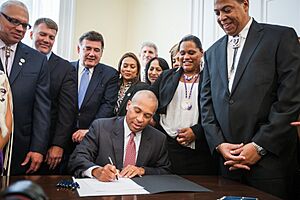
Gun Control Efforts
In 2010, Patrick supported laws to limit the purchase of firearms. He wanted to reduce gun violence in Boston. In 2011, he proposed new laws for stricter gun regulations. After the Sandy Hook Elementary School shooting in 2013, Patrick suggested even stronger gun control laws. These included limiting firearm purchases to one per month.
Education Initiatives
Throughout his time as governor, Patrick focused on improving public education. He put a lot of state money into Massachusetts schools. He also worked to close the education gap for minority students. He won the national "Race to the Top" education competition. Patrick also supported increasing the number of charter schools.
In 2008, Patrick signed a bill that provided $2.2 billion for higher education. This money went to the University of Massachusetts system and other state colleges.
Same-Sex Marriage Support
Patrick supported the legalization of same-sex marriage. He believed that all citizens should be treated equally by the government. He worked with the state legislature to protect same-sex marriage in Massachusetts. This made Massachusetts the first state to allow it.
Energy Policy Focus
Patrick proposed a bill to make it easier to get permits for wind energy projects. This bill aimed to speed up the process for building wind farms. He also focused on expanding renewable energy during his second term.
Transportation Improvements
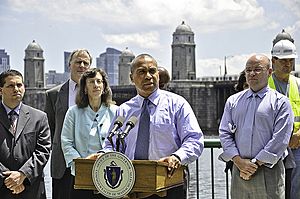
Patrick's administration worked to improve transportation in Massachusetts. A report in 2007 showed a large funding gap for maintaining the state's transportation system. Patrick helped pass a major transportation reform bill. This bill created the Massachusetts Department of Transportation by combining smaller agencies.
He supported the South Coast Rail project, which aimed to expand train service.
Immigration Response
In 2014, many children from Central America crossed the U.S. border. Patrick suggested that Massachusetts could house 1,000 of these children. They would stay in the state until their immigration cases could be processed.
Senate Appointments
Right: Mo Cowan (D), Patrick's second Senate appointment.
On September 24, 2009, Patrick appointed Paul G. Kirk as an interim U.S. senator. This was after the death of Senator Ted Kennedy.
On January 30, 2013, Patrick chose Mo Cowan, his former chief-of-staff, to serve as an interim U.S. senator. This was to fill the seat left by John Kerry.
Early Challenges as Governor
In his first months as governor, Patrick faced some criticism. There were concerns about spending on things like drapery for his office and changing his state car. Patrick admitted these were "missteps." He later paid back the state for some of these costs.
Cabinet Members
| The Patrick Cabinet | ||
|---|---|---|
| Office | Name | Term |
| Governor | Deval Patrick | 2007–2015 |
| Lieutenant Governor | Tim Murray | 2007–2013 |
| Secretaries of Executive Departments | ||
| Health and Human Services | JudyAnn Bigby | 2007–2013 |
| John Polanowicz | 2013–2015 | |
| Energy and Environmental Affairs | Ian Bowles | 2007–2011 |
| Rick Sullivan | 2011–2014 | |
| Maeve Bartlett | 2014–2015 | |
| Public Safety | Kevin M. Burke | 2007–2010 |
| Mary Elizabeth Heffernan | 2010–2013 | |
| Andrea Cabral | 2013–2015 | |
| Labor and Workforce Development | Suzanne Bump | 2007–2010 |
| Joanne F. Goldstein | 2010–2014 | |
| Rachel Kaprielian | 2014–2015 | |
| Transportation and Public Works (until 2009) | Bernard Cohen | 2007–2009 |
| Jim Aloisi | 2009 | |
| Department of Transportation (from 2009) | Jeffrey B. Mullan | 2009–2011 |
| Richard A. Davey | 2011–2015 | |
| Administration and Finance | Leslie Kirwan | 2007–2009 |
| Jay Gonzalez | 2009–2012 | |
| Glen Shor | 2013–2015 | |
| Education (created in 2008) | Paul Reville | 2008–2013 |
| Matthew Malone | 2013–2015 | |
| Housing and Economic Development | Dan O'Connell | 2007–2009 |
| Greg Bialecki | 2009–2015 | |
| Elder Affairs | Jennifer Davis Carey | 2007 |
| Michael E. Festa | 2007–2009 | |
| Ann L. Hartstein | 2009–2015 | |
| Veterans' Services | Thomas G. Kelley | 2007–2011 |
| Coleman Nee | 2011–2015 | |
| Special Advisors | ||
| Education | Dana Mohler-Faria | 2007–2008 |
Connection with President Barack Obama
During the 2008 Democratic presidential primaries, Patrick supported Barack Obama. There were some questions about similarities between their speeches, but Patrick explained that he had encouraged Obama to use similar phrases.
After Obama became president in 2008, some thought Patrick might become the United States Attorney General. However, the position went to Eric Holder. Patrick also supported Obama's campaign during the 2012 presidential election.
In 2016, Patrick was mentioned as a possible nominee for the U.S. Supreme Court.
After Being Governor
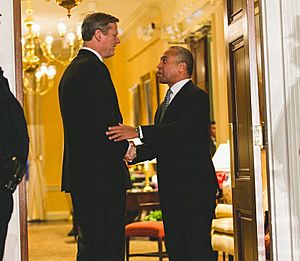
After his time as governor, Patrick joined Bain Capital in 2015. He was a founding partner of a fund that invested in companies with both financial and social goals. He left Bain Capital in 2019 to run for president, but later returned as an advisor in 2021. He also joined the board of directors for American Well, a telehealth company.
Nonprofit Work
In 2016, Patrick was appointed to the board of directors of the Obama Foundation. He also became chairman of the board for Our Generation Speaks. This program helps young Israeli and Palestinian leaders through business.
Patrick was involved with Boston's bid to host the 2024 Summer Olympics. In 2021, he launched the Future of Tech Commission. This group works to create solutions for technology policy. In 2022, Patrick became co-director of the Harvard Kennedy School's Center for Public Leadership. He also became a professor there.
Advisor for Chicago Police Reform
In December 2015, Chicago Mayor Rahm Emanuel chose Patrick to be a senior advisor. He worked with the Chicago Police Accountability Task Force. This group reviewed how the Chicago Police Department handled accountability and training. The task force finished its work in April 2016.
2020 Presidential Campaign
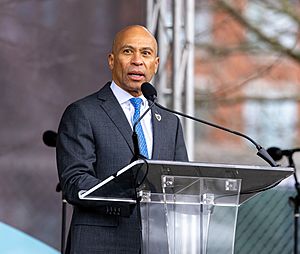
After his speech at the 2012 Democratic National Convention, people wondered if Patrick would run for president in 2016. He said he planned to return to the private sector. In 2013, he clearly stated he would not run in 2016.
However, in November 2019, Patrick announced he would enter the 2020 Democratic Party presidential primaries. He started his campaign late in the race. His campaign ads began in January 2020 in states like Iowa and New Hampshire. Patrick generally had low support in polls.
Patrick presented himself as a moderate candidate. He supported adding a public option to the existing Affordable Care Act, rather than a full "Medicare for All" system. He described himself as a "capitalist" who believed markets don't solve every problem.
After not performing well in the New Hampshire primary in February 2020, Patrick ended his campaign.
Later Political Activity
In May 2020, Patrick launched TogetherFundPAC. This group supported Joe Biden, who became the Democratic presidential nominee. In July 2024, Patrick said he would support President Joe Biden. He also mentioned he would be open to running for president if Biden decided not to seek reelection.
Electoral History
| Democratic gubernatorial primary 2006 | |||||
|---|---|---|---|---|---|
| Party | Candidate | Votes | % | ±% | |
| Democratic | Deval Patrick | 452,229 | 49.57% | ||
| Democratic | Chris Gabrieli | 248,301 | 27.22% | ||
| Democratic | Tom Reilly | 211,031 | 23.13% | ||
| Massachusetts Gubernatorial Election 2006 | |||||
|---|---|---|---|---|---|
| Party | Candidate | Votes | % | ±% | |
| Democratic | Deval Patrick | 1,234,984 | 55.6 | +10.66 | |
| Republican | Kerry Healey | 784,342 | 35.3 | -14.47 | |
| Independent | Christy Mihos | 154,628 | 6.9 | +6.2 | |
| Massachusetts Gubernatorial Election 2010 | |||||
|---|---|---|---|---|---|
| Party | Candidate | Votes | % | ±% | |
| Democratic | Deval Patrick | 1,112,283 | 48.42 | –7.21 | |
| Republican | Charlie Baker | 964,866 | 42.00 | +6.67 | |
| Independent | Tim Cahill | 184,395 | 8.03 | +1.06 | |
Personal Life
Patrick married Diane Patrick, a lawyer, in 1984. They have two daughters, Sarah and Katherine. They have lived in Milton, Massachusetts, since 1989. In 2011, his daughter Sarah married Marco Morgese. In 2013, Patrick became a grandfather when Sarah had a son.
The Patrick family also owns a home in Richmond, Massachusetts. In 2013, the governor of Illinois renamed a part of Wabash Avenue in Chicago "Deval Patrick Way" in his honor. In 2015, Harvard University gave Patrick an honorary degree.
Images for kids
See also
 In Spanish: Deval Patrick para niños
In Spanish: Deval Patrick para niños
 | Audre Lorde |
 | John Berry Meachum |
 | Ferdinand Lee Barnett |


